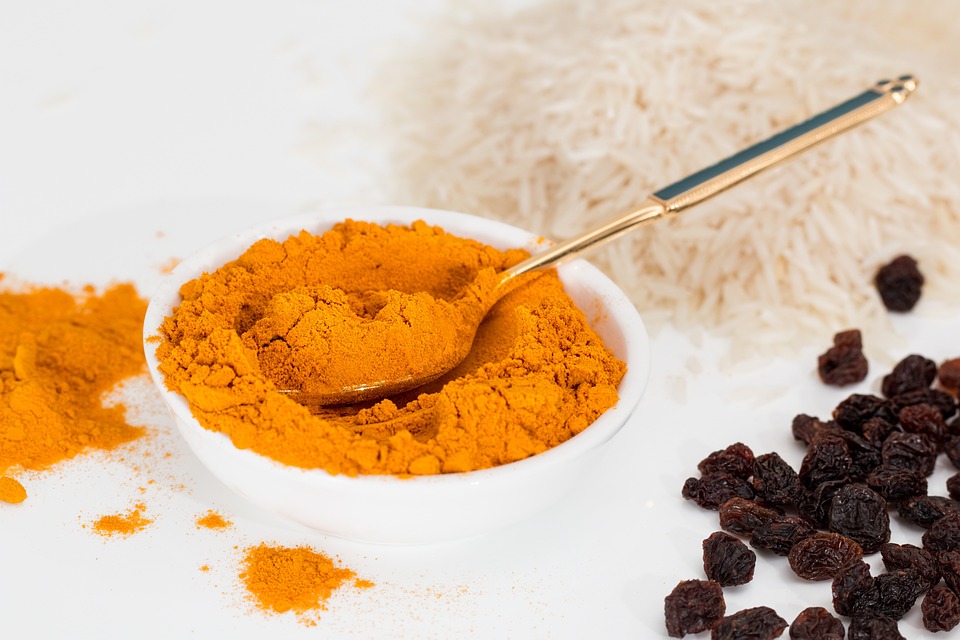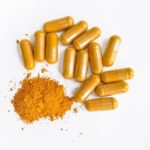Our ancestors used many herbs and spices for both cooking and their powerful medicinal properties. Turmeric has been used for centuries in traditional medicine and is one of the most well researched dietary supplements in modern natural medicine.
Turmeric is a spice that comes from the turmeric plant. The active ingredient in turmeric is curcumin, which has powerful anti-inflammatory and antioxidant properties.
What is Turmeric?
Turmeric is a spice made from Curcuma longa, a species of ginger native to Southeast Asia. The compound curcumin found within the turmeric root has shown to have strong anti-inflammatory and antioxidant properties with a wide range of uses and benefits. There are few reported side effects.
Turmeric contains roughly 3.14% curcumin, which is responsible for many of its health benefits. The most effective turmeric supplement will contain a combination of turmeric and black pepper, as well as AstraGin to improve absorption and maximize effectiveness.
Amounts of turmeric and ways to take it
Curcumin, the active ingredient in turmeric, has anti-inflammatory and antioxidant properties that may provide health benefits.
But turmeric only contains around 3% curcumin . This is why scientists who study its effects often use such large amounts of curcumin. They may take up to 1 gram each day, and sometimes as much as 12 grams. Adding turmeric to food will usually give you far more than you would get from just consuming it.
Your body does not absorb curcumin quickly, meaning that only a small percentage of what you consume gets into your bloodstream. However, there are ways to improve this.
Black pepper contains piperine, which can help increase the absorption of curcumin by up to 20 times. High doses of turmeric often contain black pepper to improve absorption.
Curcumin is better absorbed by the body when it is taken with a meal that contains fat. This is because curcumin dissolves in fat, rather than water.
Scientists have added fat molecules to curcumin to make it easier for the body to absorb.
Lipidated curcumin, which is curcumin with fats attached to it, is often used in scientific studies. Curcumin supplements that contain other substances that increase absorption are also often used.
Benefits of turmeric assessed
The strong anti-inflammatory and antioxidant properties of curcumin in turmeric have been agreed upon by scientists. It’s possible that these things may improve heart health, reduce arthritis pain, help brain function, and even treat some mental health conditions.
However, it is important to remember that most of this research is still in its early stages, with many of the studies referenced in this article only involving small numbers of participants.
Research needs to be conducted in order to determine if there are any health benefits to taking turmeric.
According to the National Center for Complementary and Integrative Health, it is not clear if turmeric, curcumin, or related compounds have any benefits for health conditions.
Although some people claim that turmeric and curcumin supplements have benefits, government agencies such as the United States Food and Drug Administration (FDA) have not approved these claims.
1. Anti-inflammatory effects
Turmeric is often used to treat inflammatory conditions, as it has anti-inflammatory effects. There is plenty of evidence to support this claim. But what exactly is inflammation?
In many cases, inflammation can be a good thing. The body protects itself by swelling around an injury and fighting off disease with cells from the immune system.
If inflammation occurs for an extended period of time, it can lead to various health problems such as heart disease, stroke, and type 2 diabetes.
The scientists concluded that curcumin can help reduce signs of inflammation in people at high risk for chronic health conditions when taken in large doses.
2. Antioxidant effects
Curcumin is an antioxidant . Antioxidants help to lower the levels of harmful “free radicals” in the body.
Free radicals are atoms with an unpaired electron in the outermost orbital. These radicals are highly reactive and can damage cells by taking electrons from other molecules, a process known as “oxidative stress.” This can have a range of effects, from making you look older, like wrinkles, to increasing your risk of getting serious diseases, like cancer.
3. Heart health
The anti-inflammatory and antioxidant properties of curcumin may help improve cholesterol levels, blood pressure, and other factors linked to heart health.
According to a study of 100 people with metabolic syndrome, taking 1g of curcumin per day, along with 10mg of piperine, can help to reduce levels of ‘bad’ cholesterol, and increase levels of ‘good’ cholesterol.
Another small study recruited healthy people aged 45–74. For a 12-week period, they took 2 grams of curcumin per day. The researchers observed an improvement in the function of endothelial cells – cells that line the walls of arteries. The cells mentioned are connected to the health of arteries, blood flow, and the likelihood of heart failure.
4. Arthritis
Osteoarthritis is a joint condition that causes pain and debilitation. It affects over 32 million people in the U.S. Some scientists believe that curcumin has the potential to be a treatment for ____________.
There is potential for curcumin to help with joint health, according to some small studies.
For example, a small study showed that people with osteoarthritis who took 200 mg of curcumin each day, with a soy-based ingredient to improve absorption, felt better.
After 3 months of treatment, the average patient reported a 58% improvement in symptoms and could walk 4 times farther in a treadmill test.
Some scientists are investigating the possibility that curcumin might help with rheumatoid arthritis. A less common form of arthritis, this one is more closely associated with inflammation.
5. Memory and focus
Some early evidence suggests that curcumin might improve brain function both in the short term and in the long term as you age.
researchers found that after taking a 400 mg dose of a lipidated curcumin supplement, healthy adults aged 60-85 improved their performance on tasks involving attention and short-term memory.
Participants who took curcumin pills saw sustained improvements compared to those who took a placebo pill.
There is a need for more research to be done in order to substantiate the health claims made about curcumin. There is not currently enough evidence to say definitively that it has benefits for brain function.
6. Anxiety and depression
The study found that participants who took curcumin improved their mood.
Other researchers have evaluated whether curcumin could potentially help treat mental health conditions such as anxiety.
In a study involving 30 people who were obese, half of them took a daily dose of 1 gram of curcumin, while the other half took a placebo. After 30 days, the groups swapped, so that those who had originally taken the placebo were now taking curcumin, and vice versa. They rated their anxiety and depression symptoms both before and after.
Participants who took curcumin had significantly reduced anxiety scores compared to those who took the placebo. However, there was no notable change in depression scores.
Other studies suggest there may be benefits for people with depression. A study found that a 6-week course of curcumin (1 g each day) was as effective at improving symptoms as the antidepressant fluoxetine (Prozac).
7. Aids Weight Loss
Obesity may cause high blood pressure, diabetes, heart disease, stroke, and other health problems. If you don’t have any health problems, losing weight is not complicated. However, if you have a pre-existing metabolic disorder, you may have more difficulty losing weight.
Several trials have shown that curcumin can help improve metabolic disorders by stabilizing metabolism and managing weight. Turmeric helps your body better use insulin, controls your lipid metabolism, and helps burn fat by suppressing processes that help adipose tissue grow.
8. Improves Skin Health
The skin is the outermost protective layer of the body. Our skin is a barrier that protects us from harmful microbes and helps regulate our internal body temperature. Conditions like acne, eczema, and psoriasis can sometimes show up on your skin and will need to be treated.
DIYers often use turmeric powder to create face masks, pastes, and other topical solutions to heal the skin. The researchers confirmed that curcumin can help to reduce the oxidative stress that is linked with inflammatory skin conditions. Turmeric also increases the synthesis of collagen and significantly speeds up the repair of tissues.
9. Natural Blood Thinner
Blood clots happen when blood cells known as platelets, go to a damaged site to fill the wounded area. This occurrence is a normal bodily function. Without clotting, small papercuts would become catastrophic. Some health conditions sometimes require blood thinning to prevent blockages.
Curcumin supplements may help to thin the blood under certain conditions. Turmeric extract affects several aspects of the coagulation process, including thrombosis (local blood clotting) and hemostasis (stopping blood flow). More human trials need to be conducted to determine the effectiveness of the treatment.
10. Improves Allergies & Asthma
An allergyDevelops when the immune system incorrectly Identifies a foreign substance as being harmful to the body and reacts excessively to it. The body produces antibodies in response to allergens during an allergic reaction, which can cause a range of symptoms like coughing, sneezing, and itching.
Turmeric’s anti-inflammatory properties can help relieve allergy symptoms and reduce the chances of having an asthma attack. The current research suggests that a curcumin supplement can reduce the symptoms of sneezing, nasal congestion and a runny nose, which are all linked to restricted nasal airflow and hay fever.
11. Aids in Liver Detoxification
A liver detox, also known as a cleanse, is a process of removing toxins from the blood and metabolizing nutrients to ensure our body gets what it needs. The liver is like the body’s main filtering system. A healthy liver is key to optimal physical and mental health.
Several studies have demonstrated that curcumin can limit the damage to the liver from harmful substances by interrupting inflammatory pathways. Turmeric also helps the body get rid of waste by stimulating the production and release of bile from the gallbladder.
12. Helps Headaches & Migraines
Headaches and migraines are tremendously difficult to handle. There are many factors that can contribute to immense pain and discomfort, including stress, fatigue, insufficient sleep, inflammation, poor posture, neck tension, and several others.
Curcumin appears to be effective in treating headaches and migraines due to its anti-inflammatory and antioxidant properties. What is known is that turmeric can reduce pain that is linked to inflammation and also inhibit oxidative stress within the body.
Side Effects and Dosage
How much turmeric should you take daily? It is recommended that you take between 150-250 mg of curcumin per day. It is safe and effective to take this drug within this dosing range.
Is turmeric good to take everyday? You should be fine to consume this daily as long as you stay within the correct dosing range. Turmeric is most effective in targeting systemic inflammation after 4-8 weeks of continuous use. If you use it only when needed, it may be more effective. Consistency is key.
When should I take turmeric curcumin? When you take curcumin is a personal preference. You can take CBD oil during bouts of inflammation, in the morning to improve focus and mental clarity, or even at night before bed to lower inflammation while you recover. It’s up to the user and their goals.
What are the negative side effects of turmeric? Most people can take curcumin supplements without experiencing any adverse effects. Turmeric side effects are quite rare and usually mild. However, there are a few potential adverse reactions you may experience.
- Turmeric may be able to lower blood sugar. Diabetics should use extra caution.
- Turmeric contains anticoagulant properties and may be able to thin the blood.
- Excessive dosages may cause digestive discomfort in some individuals.
Who should not take turmeric? Women who are pregnant or nursing should avoid turmeric. It is unknown if consuming large amounts of this substance is safe. You should avoid turmeric if you are scheduled for surgery in the near future. Turmeric may effects how the blood clots, which could cause complications.
Final Thoughts on Health Benefits of Turmeric Curcumin
If you are wondering what the benefits of turmeric are, the answer is that it is good for almost everything. It’s important to keep in mind that turmeric supplements are not a cure-all for diseases or chronic conditions. The unique medicinal properties of curcumin have shown to have significant health benefits and uses in modern natural medicine.
Most studies show that turmeric root extract is effective and well-tolerated at high dosages. There are usually no side effects. If you’re considering adding turmeric pills to your daily routine, it’s always best to consult with a doctor or primary care physician beforehand. It is very important to make sure that any dietary supplement you take does not interact with any medications you are already taking.



